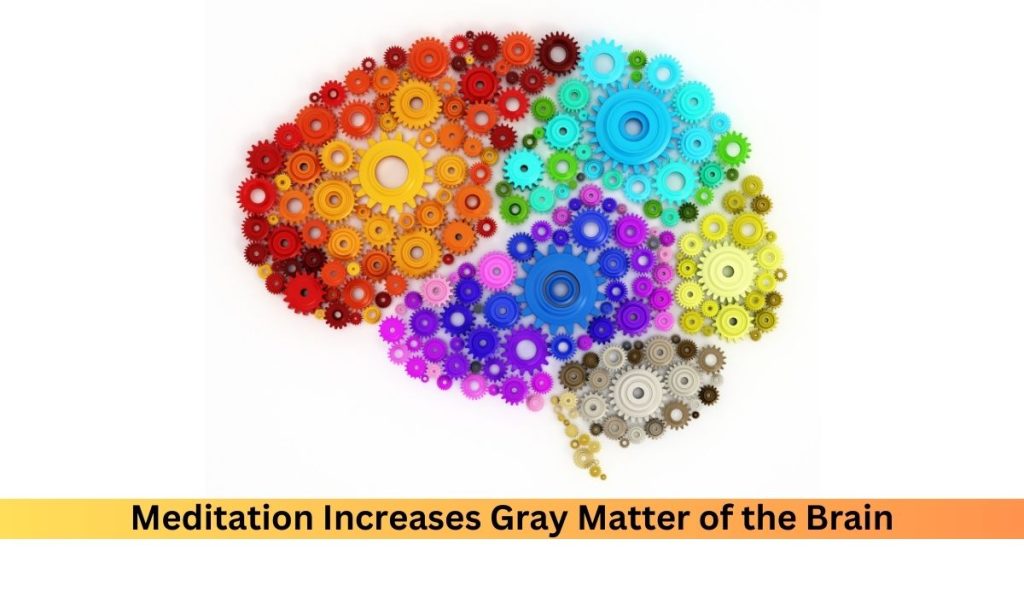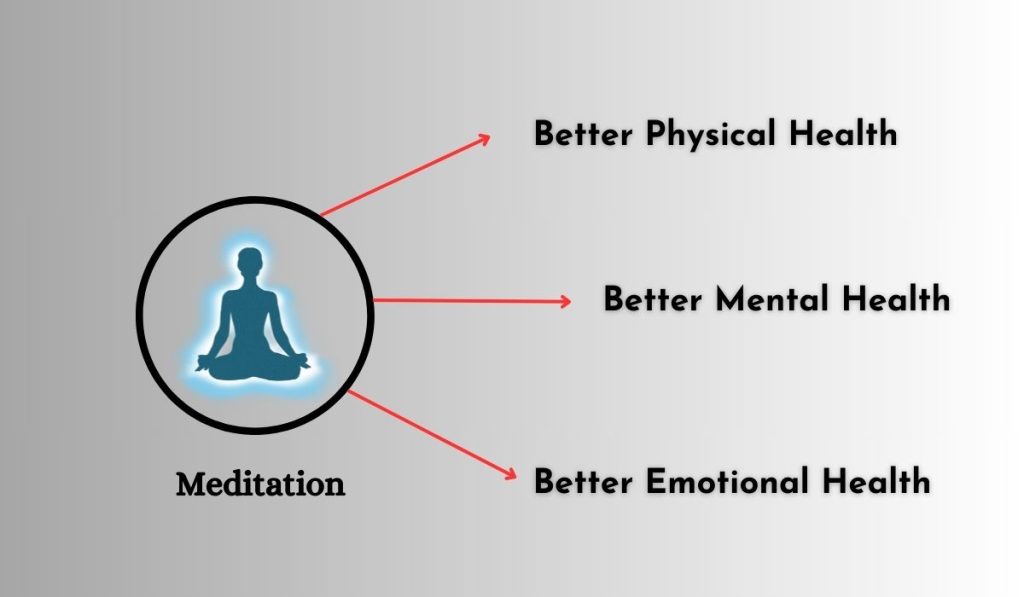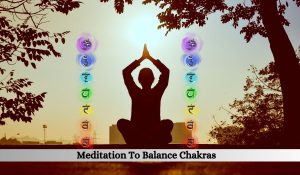Key Takeaways
- Meditation: A practice to focus the mind, reduce stress, and enhance mental clarity.
- Neuroplasticity: Meditation helps create new neural pathways, enhancing mental health and emotional regulation.
- Benefits: Meditation improves focus, emotional balance, sleep quality, self-awareness, and immune function.
- Meditation Yoga: Combines physical postures with meditation to prepare the body and mind for deeper practice.
- Beginners: Start with simple techniques, like focusing on breathing or using guided sessions, to develop a regular practice.
- Vipassana: A specific meditation type focused on self-awareness and observing thoughts without attachment.
- Healing: While not a cure, meditation supports stress reduction and overall well-being.
Introduction
Meditation is a popular activity in our busy modern world, and it’s famous for helping both your mind and body. But what is meditation exactly, and how do you begin? If you’re new to meditation or want to get better at it, this guide will explain what meditation is, its different kinds, and the good things it can do for you.
What is Meditation?
Meditation is a technique where you concentrate your thoughts and block out interruptions to reach a relaxed, clear, and peaceful state of mind. It comes from old customs such as Buddhism and Hinduism and has been done for centuries. Today, it’s well-known around the globe as a way to handle tension, improve self-understanding, and support general health.
Meditation vs. Manifestation vs. Mindfulness
Although people sometimes use these words as if they mean the same thing, they describe different activities. Meditation means working on your mind to concentrate and change your thoughts, usually to get a clear mind and feel calm. Manifestation is about clarifying what you want and visualizing your goals to make them happen. Mindfulness is the act of being focused and completely involved in whatever you’re doing right now, which is often a part of meditation but can also be done independently.
Meditation and the Brain

Meditation is not just a mental activity; it changes the brain physically. Studies show that consistent meditation can enlarge the gray matter in the brain, especially in parts that deal with learning, memory, and managing emotions. Gray matter contains most of the brain’s neuronal cell bodies and is crucial for processing information, making decisions, and regulating emotions. This ability of the brain to change and adapt over time is called neuroplasticity. Through meditation, we can form new connections in the brain that enhance our mental and emotional well-being.
Principles of Meditation
The core principles of meditation are simple but profound. These include:
- Focus and Concentration: Meditation starts with keeping your mind on one thing, like your breathing, a word you repeat, or something you look at. This helps you ignore other things, clear your thoughts, and feel very relaxed and aware.
- Breath Awareness: Your breath is a great tool for meditation. Paying attention to how you breathe naturally helps you focus, calm down, and stay in the present.
- Mindfulness: Being mindful means being fully aware of what’s happening right now. It’s about noticing your thoughts, feelings, and body sensations without criticizing them. This helps you stay calm and clear-headed.
- Non-Attachment: Meditation teaches us to not hold onto thoughts, feelings, or outside things too tightly. By watching them without getting attached, we learn to stop reacting so much and find inner peace.
- Acceptance: In meditation, it’s important to accept situations as they are without trying to alter them. This approach helps create a sense of calm and reduces the stress that comes from resisting or holding onto specific results.
- Compassion and Loving Kindness: Various meditation techniques involve focusing on developing compassion and loving-kindness for yourself and others. This approach helps improve your outlook, strengthens your ability to handle emotions, and encourages empathy.
- Regular Practice: Being consistent is key in meditation. Practicing meditation regularly, even if it’s just a few minutes every day, helps strengthen its benefits and makes it a normal part of your daily routine.
- Patience and Determination: Meditation is a skill that grows with practice. It needs patience and determination, particularly when your mind is busy or wandering. As you keep practicing, these traits help improve your meditation experience.
Types of Meditation
There are many different ways to meditate, and each one has its special way of doing things. Here are seven common types, along with some tips on which one might be good for different situations:
- Mindfulness Meditation: This type of meditation encourages you to stay focused on the present moment and pay attention to your thoughts and feelings without criticizing them. It’s good for lowering stress and improving your awareness.
- Transcendental Meditation: This meditation method uses a repeated word or phrase to help calm your mind and reach a peaceful state. It’s best for people who want to relieve stress and find peace within themselves. An example of a mantra could be a simple word like “Om” or a phrase like “I am calm.”
- Guided Meditation: This involves listening to someone guide you or a recording that takes you through a meditation session. It’s perfect for beginners who need a structured and guided approach.
- Vipassana Meditation: Also called Insight Meditation, this practice teaches you to observe your thoughts and feelings as they happen. Unlike mindfulness meditation, which focuses on being present and aware of the current moment, Vipassana involves a deeper investigation into the nature of thoughts and sensations to gain profound insights into the self and reality. It helps in understanding yourself better and gaining deeper insights.
- Loving-Kindness Meditation: This meditation focuses on developing love and kindness towards yourself and others. It’s great for increasing empathy and emotional connections.
- Chakra Meditation: This practice helps to even out the energy points in your body, called chakras. It usually includes imagining things like colored lights or symbols associated with each chakra and taking slow, steady breaths. It’s great for people who want to want to align their energy centers and connect with their higher consciousness.
- Zen Meditation (Zazen): This is a type of sitting meditation that focuses on breathing and staying focused. It’s good for people who want to feel very relaxed and improve their ability to concentrate.
Meditation for Beginners
Meditation might seem challenging at the beginning, but it can be easy. Here are some basic methods to help you start your meditation journey:
- Start Small: Begin with just 5-10 minutes a day. Consistency is more important than duration.
- Find a Quiet Space: Choose a place where you won’t be disturbed. It can be a corner of your room or a quiet spot in nature.
- Focus on Your Breath: Close your eyes and take slow, deep breaths. Focus on the sensation of your breath entering and leaving your body.
- Use Guided Meditations: There are numerous apps and online resources that offer guided meditations, perfect for beginners.
- Be Patient: It’s normal for the mind to wander. When it does, gently bring your focus back to your breath or chosen point of focus.
Here is a great video on meditation posted in a TED Talk that gives great insights about its benefits and why should we do it:-
What is Meditation Yoga?
Meditation Yoga, also known as Dhyana Yoga, is a practice that mixes physical poses (asanas) with meditation. The aim is to get the body ready for meditation by letting go of stress and encouraging relaxation. This practice improves physical flexibility and also helps the mind get ready for deeper meditation.
Is Vipassana and Meditation the Same?
Vipassana is a particular kind of meditation, sometimes called Insight Meditation. It focuses on noticing the thoughts, feelings, and physical sensations that come up, which helps people understand more about their minds. For example, during Vipassana, one might notice a thought like “I am not good enough,” leading to the insight that this thought is just a mental pattern, not a truth, which can help in overcoming self-doubt. Although all Vipassana involves meditation, not all meditation practices are Vipassana. There are many different types of meditation, each with its methods and purposes.
Benefits of Meditation

Meditation offers a multitude of benefits, including:
- Reduced Stress and Anxiety: Meditation soothes the mind, making it easier to handle stress and worry.
- Improved Focus and Concentration: Meditation teaches the mind to concentrate better, which improves focus and work efficiency.
- Emotional Balance: Helps control emotions and creates a peaceful and happy state of mind.
- Better Sleep: Meditating often can help you sleep more soundly by making you feel more relaxed and less stressed.
- Enhanced Self-Awareness: Meditation helps you understand yourself better, which can lead to personal development and better self-care.
- Lower Blood Pressure: Meditation can lower blood pressure, which is good for your heart.
- Improved Immune Function: Meditation reduces stress and relaxes the body, which helps your immune system fight off illness.
Final Verdict
Meditation is a strong method for enhancing mental, emotional, and physical health. By learning its basics and trying different forms, anyone can add meditation to their daily routine. Regular meditation practice brings many advantages, such as lower stress, better concentration, and improved emotional stability. Whether you’re new to meditation or have been doing it for a while, it can be a life-changing activity that boosts your overall well-being and inner calm.
1. Can meditation cure anxiety?
Meditation can be a helpful way to handle worry. It encourages relaxation and teaches you to be present, which can lessen the signs of anxiety. But it’s not a solution for everything. It should be combined with other treatments and changes in your daily life as part of a complete plan to deal with anxiety.
2. Can meditation cure depression?
Meditation can ease depression by helping you manage your feelings and lowering stress, but it’s not a complete solution on its own. It works best when combined with other treatments such as therapy and medication.
3. Can meditation heal the body?
Meditation helps the body heal itself by lowering stress, decreasing blood pressure, and strengthening the immune system. Although it doesn’t treat physical illnesses, it can improve general health and happiness.
4. What meditation did Buddha practice?
Buddha did a meditation called Vipassana, or Insight Meditation. This type of meditation helps you watch your thoughts and feelings without getting too involved, to improve self-understanding and gain deeper insights.
5. Does meditation cure physical health problems?
Meditation doesn’t directly cure physical health issues, but it can work alongside medical treatments. It helps lower stress and encourages relaxation, which can enhance overall health and aid in healing.




